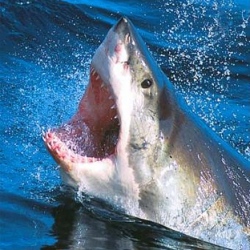
The growing demand for shark fin as an ingredient in Chinese cuisine has caused an explosion in the number of shark fisheries in recent decades. But sharks are important members of ocean food chains, and removing them can have unintended consequences. Our new study, conducted off the coast of northwest Australia, shows that killing sharks isn’t just bad for sharks; it can also harm coral reefs.
What do sharks have to do with coral?
Sharks are apex predators – they live at the top of the food chain. They grow slowly, mature late and have relatively low rates of reproduction. This means that their populations have little resilience to harvest and as a result, over-fishing of sharks has now become a worldwide problem.
Nowhere is immune to this phenomenon, as rising prices for shark fin drive fishermen to search every corner of the oceans to harvest sharks. Coral reefs, once renowned for their abundance of sharks, have been targeted by both legal and illegal fishermen so that today even areas as large and as well-managed as the Great Barrier Reef show alarming signs of diminishing shark populations.
While we recognise this loss is occurring, we still have very little idea of what effect the removal of sharks has on coral reef ecosystems.
This is because in most places, fishing is just one of many processes such as coral bleaching, cyclone damage, attacks by crown of thorns starfish, pollution and eutrophication that can occur simultaneously, all of which alter the structure of the reef in fundamental ways. Disentangling the effects of the loss of sharks from these other influences can be a daunting task.
